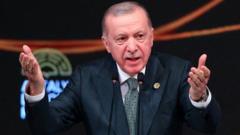Amidst decreasing popularity and a politically charged environment, Turkish President Recep Tayyip Erdogan has publicly denied aspirations to alter the constitution for a potential fourth term. His statements come as the opposition, particularly the detained Istanbul mayor Ekrem Imamoglu, gains momentum.
Erdogan Quashes Rumors of Constitutional Change to Extend Presidency

Erdogan Quashes Rumors of Constitutional Change to Extend Presidency
Turkish President Recep Tayyip Erdogan asserts he is not pursuing constitutional amendments to secure another term, despite growing speculation.
Turkish President Recep Tayyip Erdogan has denied any intentions to amend the constitution in order to extend his presidency beyond 2028, when his current term is set to conclude. Erdogan, who has been at the helm of Turkish politics for 22 years—first as prime minister and then as president—insisted to reporters on Thursday that discussions concerning a new constitution are solely for the benefit of the country, not his political ambitions. "I have no interest in being re-elected or running for office again," he declared.
Despite this statement, many analysts note that his recent activities and comments have stirred speculation about his desire to cling to power. When an artist inquired last January whether he would consider another run, Erdogan responded humorously, "I am, if you are." Furthermore, his party's spokesperson later confirmed that the topic of his potential re-election is indeed on the agenda.
Polls indicate that Erdogan is currently in a challenging position, trailing behind Istanbul's opposition mayor Ekrem Imamoglu, who is presently imprisoned on corruption charges that many supporters claim are politically motivated. Imamoglu's arrest has ignited significant demonstrations, marking some of the largest protests in Turkey in over a decade. Moreover, his incarceration appears to have bolstered his popularity, while Erdogan’s government has restricted his social media presence and has targeted his city officials, with recent detentions linked to alleged corruption.
In his statements, Erdogan criticized the current constitution, suggesting it fails to reflect the views of the Turkish populace since it was largely framed in the aftermath of a military coup in 1980. He questioned the validity of governing under a constitution that emerged under such dire circumstances, despite acknowledging its amendments over the years. According to Turkish law, the constitution permits two five-year presidential terms, and Erdogan is currently on his third. He argues, however, that his original term should not count due to Turkey's transition from parliamentary to presidential governance established by a 2017 referendum that dramatically increased his powers.
Altering the constitution would necessitate the backing of at least 360 Members of Parliament in Turkey's 600-seat assembly; Erdogan's party currently controls 321 seats. If Erdogan can muster support from the pro-Kurdish Democratic Regions Party (DEMP), which could strengthen his parliamentary majority, he may mimic moves to address the decades-long conflict with the Kurdish militant group PKK to win Kurdish approval.
Critics, including leadership from Imamoglu's opposition party, contend that Erdogan’s attempts to modify the constitution are futile given the stringent rules he himself supported. Moreover, while the option to call early elections exists, Erdogan appears to be firmly against such a scenario, reflecting a cautious approach in a landscape of increasing political unrest.



















